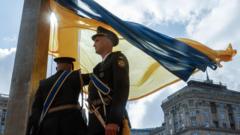Russia has attributed a fire at a nuclear power plant in its western Kursk region to drone strikes launched by Ukraine, asserting that several Russian energy facilities were targeted overnight. Fortunately, the fire was swiftly extinguished without any injuries, according to the plant's press service on Telegram. They reported that the incident caused damage to a transformer, but confirmed that radiation levels remained normal.
In another incident, a blaze erupted at the port of Ust-Luga in Russia's Leningrad region, a significant fuel export terminal, with regional officials claiming that approximately 10 drones from Ukraine were intercepted, which allegedly sparked the fire. Ukraine has not yet responded to these accusations from Russia.
The United Nations’ International Atomic Energy Agency (IAEA) has called for both nations to exercise maximum restraint surrounding nuclear facilities in the region. This escalation comes on Ukraine's independence day, a date that commemorates its secession from the Soviet Union in 1991.
On this important day, Canadian Prime Minister Mark Carney arrived in Kyiv to offer support, engaging with Ukrainian President Volodymyr Zelensky. Zelensky’s chief of staff, Andriy Yermak, highlighted the significance of international solidarity, particularly on such a pivotal date. Canada has historically stood by Ukraine, as evidenced by King Charles's heartfelt message conveying his admiration for the Ukrainian people, which Zelensky described as an inspiring gesture amidst the ongoing conflict.
The UK is also displaying support, with Ukrainian flags to fly over Downing Street on this occasion. The Ministry of Defence reaffirmed its commitment to training Ukrainian soldiers through the continuation of Operation Interflex until at least the end of 2026.
Norway announced a significant commitment of around 7 billion kroner (approximately £514 million) towards enhancing Ukraine's air defense systems, collaborating with Germany to ensure the provision of effective military support.
As the conflict continues, Russia claimed to have gained control of two villages in the Donetsk region, yet their advances have been costly and slow, with Russian forces currently controlling an estimated 20% of Ukrainian territory.
The recent weeks have seen intensified diplomatic interactions regarding the conflict, including a high-profile meeting between US President Donald Trump and Russian President Vladimir Putin aimed at negotiating peace. However, frustration over the stagnation of peace talks has been evident, with potential discussions of imposing further economic sanctions looming.
In the backdrop of these geopolitical developments, President Zelensky has advocated for an unconditional ceasefire, asserting that Russian tactics have hindered peace negotiations. Russia’s Foreign Minister Sergei Lavrov remarked that President Putin remains willing to meet with Zelensky when a suitable agenda is established, while accusing Ukraine of rejecting every proposal.
















